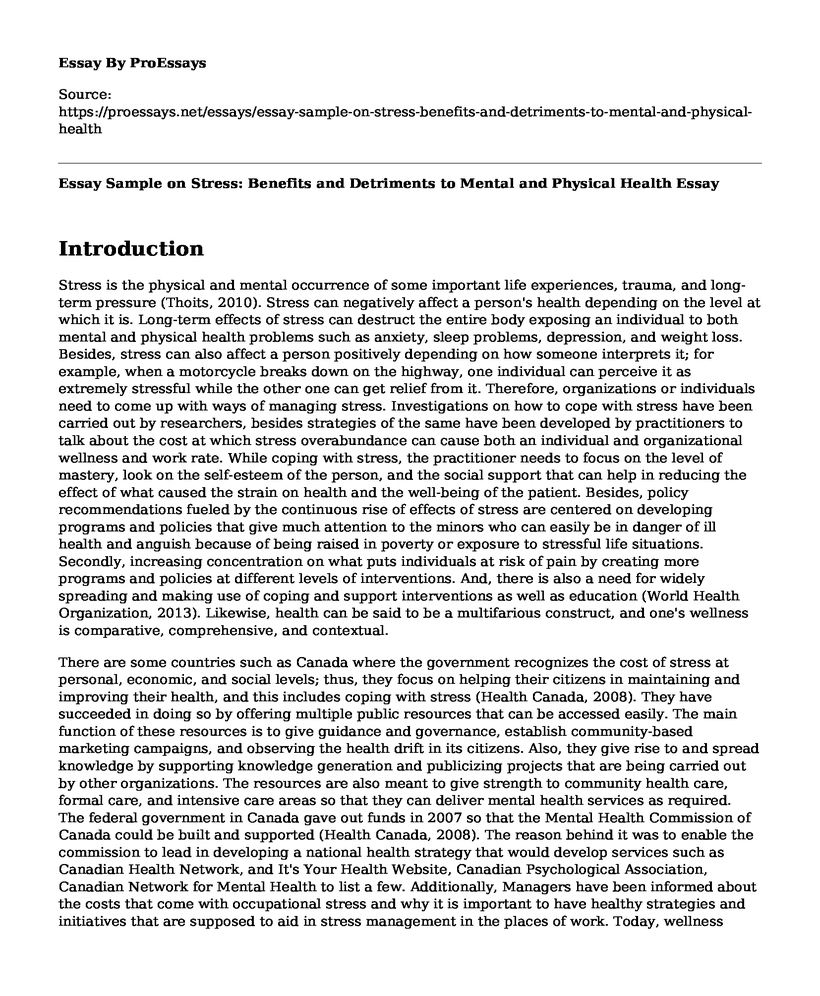Introduction
Stress is the physical and mental occurrence of some important life experiences, trauma, and long-term pressure (Thoits, 2010). Stress can negatively affect a person's health depending on the level at which it is. Long-term effects of stress can destruct the entire body exposing an individual to both mental and physical health problems such as anxiety, sleep problems, depression, and weight loss. Besides, stress can also affect a person positively depending on how someone interprets it; for example, when a motorcycle breaks down on the highway, one individual can perceive it as extremely stressful while the other one can get relief from it. Therefore, organizations or individuals need to come up with ways of managing stress. Investigations on how to cope with stress have been carried out by researchers, besides strategies of the same have been developed by practitioners to talk about the cost at which stress overabundance can cause both an individual and organizational wellness and work rate. While coping with stress, the practitioner needs to focus on the level of mastery, look on the self-esteem of the person, and the social support that can help in reducing the effect of what caused the strain on health and the well-being of the patient. Besides, policy recommendations fueled by the continuous rise of effects of stress are centered on developing programs and policies that give much attention to the minors who can easily be in danger of ill health and anguish because of being raised in poverty or exposure to stressful life situations. Secondly, increasing concentration on what puts individuals at risk of pain by creating more programs and policies at different levels of interventions. And, there is also a need for widely spreading and making use of coping and support interventions as well as education (World Health Organization, 2013). Likewise, health can be said to be a multifarious construct, and one's wellness is comparative, comprehensive, and contextual.
There are some countries such as Canada where the government recognizes the cost of stress at personal, economic, and social levels; thus, they focus on helping their citizens in maintaining and improving their health, and this includes coping with stress (Health Canada, 2008). They have succeeded in doing so by offering multiple public resources that can be accessed easily. The main function of these resources is to give guidance and governance, establish community-based marketing campaigns, and observing the health drift in its citizens. Also, they give rise to and spread knowledge by supporting knowledge generation and publicizing projects that are being carried out by other organizations. The resources are also meant to give strength to community health care, formal care, and intensive care areas so that they can deliver mental health services as required. The federal government in Canada gave out funds in 2007 so that the Mental Health Commission of Canada could be built and supported (Health Canada, 2008). The reason behind it was to enable the commission to lead in developing a national health strategy that would develop services such as Canadian Health Network, and It's Your Health Website, Canadian Psychological Association, Canadian Network for Mental Health to list a few. Additionally, Managers have been informed about the costs that come with occupational stress and why it is important to have healthy strategies and initiatives that are supposed to aid in stress management in the places of work. Today, wellness industries are doing well both locally and internationally.
References
Health Canada. (2008). Mental health - coping with stress. http://www.hc-sc.gc.ca/hl-vs/iyh-vsv/life-vie/stress-eng.php.
Thoits, P. A. (2010). Stress and health: major findings and policy implications. Journal of Health and Social Behavior, 51(1), suppl S41-S53.
World Health Organization. (2013). Guidelines for the management of conditions specifically related to stress. http://apps.who.int/iris/bitstream/10665/85119/1/9789241505406_eng.pdf?ua=1.
Cite this page
Essay Sample on Stress: Benefits and Detriments to Mental and Physical Health. (2023, Mar 01). Retrieved from https://proessays.net/essays/essay-sample-on-stress-benefits-and-detriments-to-mental-and-physical-health
If you are the original author of this essay and no longer wish to have it published on the ProEssays website, please click below to request its removal:
- Essay Sample on Sufism Meditation
- The Effects of Divorce on Children Paper Example
- Research Paper on Refraining and Managing Stress in the 21st Century
- Bipolar Disorder - Essay Sample
- Essay Sample on Exploring Autism at a Preschool Setting
- Love & Folly in Shakespeare's Twelfth Night - Essay Sample
- Paper Example on IQ Score Variance in Student: Case Study







